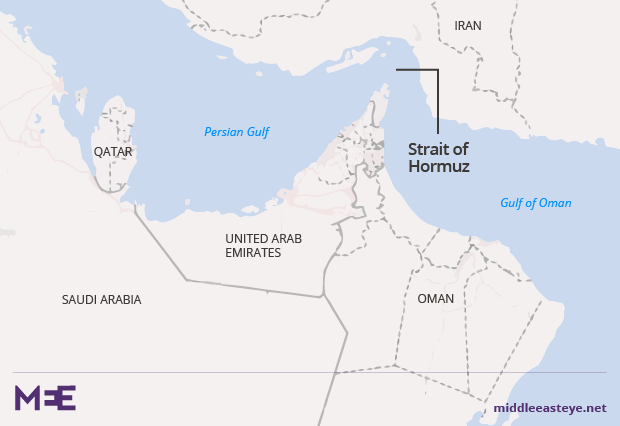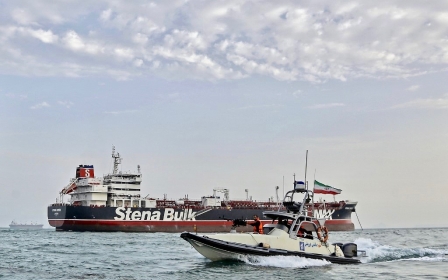Britain's call for European-led naval force in Gulf receives backing

European countries have vowed to support Britain's call for a European-led force to ensure safe passage of vessels navigating the Straits of Hormuz, just days after Iran seized a UK-flagged tanker in the strategic Gulf channel.
France, Italy, the Netherlands and Denmark support a European-led naval mission, three senior EU diplomats told Reuters on Tuesday, with Spain, Sweden, Poland and Germany also showing interest.
The mission to protect vital Middle East oil shipping lanes could be run by a joint Franco-British command, one of the envoys said.
UK Foreign Secretary Jeremy Hunt said in parliament on Monday that the British government was seeking to "put together a European-led maritime protection mission", Reuters news agency reported.
The mission aims "to support safe passage of both crew and cargo in this vital region", Hunt said.
Stay informed with MEE's newsletters
Sign up to get the latest alerts, insights and analysis, starting with Turkey Unpacked
On Friday, Iran's Revolutionary Guards seized the Stena Impero, a UK-flagged tanker, in the Strait of Hormuz, accusing the ship of breaching "international maritime rules".
The UK has rejected Iran's explanation, however, calling the seizure an act of "state piracy".
"Under international law Iran had no right to obstruct the ship's passage - let alone board her. It was therefore an act of state piracy," Hunt told parliament on Monday.
The incident comes after weeks of heightened tensions between Iran and the United States, which has blamed the Iranian government for a string of attacks on vessels in the Gulf region. Iran has denied those allegations.
On Monday, the country's foreign minister, Mohammad Javad Zarif, warned Western countries against starting a conflict.
"Starting a conflict is easy, ending it would be impossible," Zarif told reporters after a meeting in Nicaragua with his counterpart there.
"It's important for everybody to realise, it's important for Boris Johnson to understand, that Iran does not seek confrontation," he said.
Zarif also rejected claims that Iran's seizure of the Stena Impero was an act of retribution for the capture of an Iranian ship off the coast of Gibraltar earlier this month.
On 9 July, a top American general said the Trump administration hoped to build an international coalition to patrol the Strait of Hormuz and Bab el-Mandeb, a strait located between Yemen, Eritrea and Djibouti.
Joseph Dunford, the chairman of the Joint Chiefs of Staff, said the US military would provide command ships and surveillance technology, while its allies would escort ships and patrol the areas.
But earlier on Monday, US Secretary of State Mike Pompeo said the UK should protect its own vessels.
"The responsibility in the first instance falls to the United Kingdom to take care of their ships," Pompeo said in an interview with Fox News.
Pompeo added that the seizure of the British ship was not caused by US sanctions against Iran, accusing Tehran of conducting "terror around the world" for the past 40 years.
On Monday, Hunt stressed that the UK's proposal for a European-led force to ensure safe passage in the strait would not involve backing Washington's hardline stance against Iran, Reuters reported.
The mission "will not be part of the US maximum pressure policy on Iran because we remain committed to preserving the Iran nuclear agreement", Hunt said.
US President Donald Trump's decision to withdraw from that 2015 agreement - under which Iran agreed to curb its nuclear programme in exchange for a lifting of sanctions - has drawn the ire of its allies in Europe.
Since pulling out of the accord, Trump has reimposed sanctions on several key Iranian industries as part of its "maximum pressure" strategy against the country.
Middle East Eye delivers independent and unrivalled coverage and analysis of the Middle East, North Africa and beyond. To learn more about republishing this content and the associated fees, please fill out this form. More about MEE can be found here.






